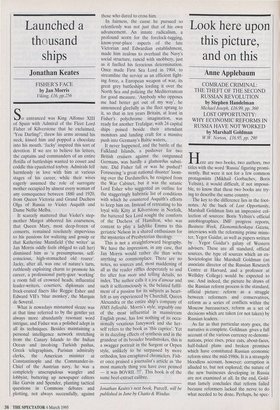Launched a thousand ships
Jonathan Keates
FISHER'S FACE by Jan Morris Viking, £16, pp.256 So entranced was King Alfonso XIII of Spain with Admiral of the Fleet Lord Fisher of Kilverstone that he exclaimed, `You Darling!', threw his arms around his neck, kissed him and popped a chocolate into his mouth. 'Jacky' inspired this sort of devotion. If we are to believe his letters, the captains and commanders of an entire flotilla of battleships wanted to cosset and coddle this epauletted toyboy. Admirals fell harmlessly in love with him at various stages of his career, while their wives eagerly assumed the role of surrogate mother occupied by almost every woman of any consequence between 1880 and 1920, from Queen Victoria and Grand Duchess Olga of Russia to Violet Asquith and Dame Nellie Melba.
It scarcely mattered that Violet's step- mother Margot abhorred his coarseness, that Queen Mary, most deep-frozen of consorts, remained resolutely impervious to his passions for waltzing and gossip or that Katherine Mansfield (`the writer' as Jan Morris oddly feels obliged to call her) dismissed him as 'a presumptuous, self- conscious, high-stomached old roarer'. Jacky, after all, was one of nature's tarts, ruthlessly exploiting charm to promote his career, a professional party-goer 'working' a room full of crowned heads, influential leader-writers, courtiers, diplomats and frock-coated fixers like Reggie Esher and Edward VII's 'blue monkey', the Marquis de Soveral.
What is nowadays misnamed sleaze was at that time referred to by the gentler yet always more abundantly resonant word intrigue, and Fisher was a polished adept in all its techniques. Besides maintaining a personal intelligence network stretching from the Canary Islands to the Indian Ocean and involving Turkish pashas, Greek telegraphists, Parisian admiralty clerks, the American minister at Constantinople and the Commander-in- Chief of the Austrian navy, he was a completely unscrupulous wangler and lobbyist, buttering up newspaper editors like Garvin and Spender, planting tactical questions in Commons debates and plotting, not always successfully, against those who dared to cross him.
In fairness, the cause he pursued so relentlessly was not just that of his own advancement. An innate radicalism, a profound scorn for the forelock-tugging, know-your-place aspects of the late Victorian and Edwardian establishment, made him zealous to overhaul the Navy's social structure, rancid with snobbery, just as it fuelled his ferocious determination. Once made First Sea Lord in 1904, to streamline the service as an efficient fight- ing force, a European weapon of war, its great grey battleships lording it over the North Sea and policing the Mediterranean for good measure. 'Anybody who opposes me had better get out of my way', he announced gleefully as the fleet sprang to it, so that in ten years Britain, at least in Fisher's polychrome imagination, was ready for another Trafalgar, with 24 capital ships poised beside their attendant monitors and landing craft for a massive push into Germany's Baltic waters,.
It never happened, and the battle of the Falkland Islands, a pushover for two British cruisers against the outgunned Germans, was hardly a glamordus substi- tute. Did Fisher fall or was he pushed? Foreseeing 'a great national disaster' loom- ing over the Dardanelles, he resigned from the War Cabinet, but it was the satanic Lord Esher who suggested an outline for the staggeringly hubristic list of conditions with which he countered Asquith's efforts to keep him on. Instead of retreating to his loyal wife Kitty at Kilverstone in Norfolk, the battered Sea Lord sought the comforts of the Duchess of Hamilton, who was content to play a ladylike Emma to this geriatric Nelson in a shared enthusiasm for the mysteries of Presbyterian theology.
This is not a straightforward biography. We have the impression, in any case, that Jan Morris would rather die than write anything so commonplace. There are no notes, no sources and, most maddening of all as the reader riffles desperately to and fro after bon mots and telling details, no index. The author calls it a jeu d'amour and such it selfconsciously is, the belated fulfil- ment of a passion for its subjects as heart- felt as any experienced by Churchill, Queen Alexandra or the entire ship's company of HMS Inflexible. Morris's style, arguably one of the most influential in mainstream English prose, has lost nothing of its occa- sionally vexatious fancywork and she her- self refers to the book as 'this caprice'. Yet in its dazzling effects of synthesis and in the grandeur of its broader brushstrokes, this is a swagger portrait in the Sargent or Orpen style, unlikely to be surpassed by more orthodox, less enraptured chroniclers. Fish- er once praised a journalist's article as 'the most masterly thing you have ever penned — it was BOVRIL This book is of the same beef-extract calibre.
Jonathan Keates's next book, Purcell, will be published in June by Chatto & Windus.


























































 Previous page
Previous page